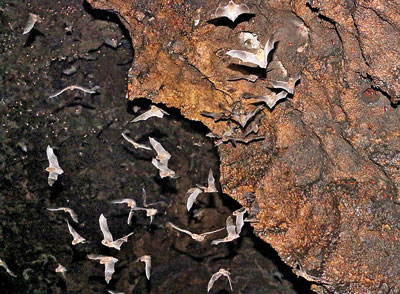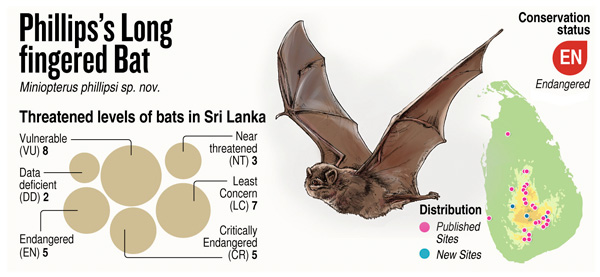News
Researchers confirm new species of bat
View(s):
Lead resercher Tharaka Kusuminda
By Kasun Warakapitiya
Biologist and researcher, Mr Tharaka Kusuminda, who led the team, cautioned that most species of bat face habitat loss.
Bats that eat fruit and insects are losing their roosting places as forests are being cleared.
Mr Kusuminda said Sri Lanka, which had 31 species of bat along with the newly identified species, are also threatened by the use of chemical fertilisers in agriculture.
Bats play an important role in the environment as the fruit eating species helps to disperse seed in the forests, while the insect eating bats prey on crop-destroying pests.
The newly-discovered bat is scientifically known as Miniopterus phillipsi, and Phillip’s long-fingered bat in English.
This is the first time that a new species of Miniopterus bat has been discovered in the country and India after eight decades. It was also the first time that a new bat species of this genus had been discovered in Asia after six decades.
The newly-found species of bat chooses only rock caves and similar places as their day roost, which is a matter of concern in conservation.
The destruction of ecosystems in the guise of informal development projects in Sri Lanka is a threat and the destruction of large rocks for granite, will directly affect the future survival of this bat species, Mr Kusuminda said.
He said that though animal specimens related to this new species of bat have been found from Sri Lanka and India before, they has been identified as a different species.
Mr Kusuminda, a doctoral candidate of Ruhunu University, said that morphological and genetic data of this species of bat has been used in the research.

In flight: Colony of new species of bat
He said that previously, these bats were mistakenly identified as the species Miniopterus fuliginosus. However, it was found that the species is spread only in the temperate climates of South Asia and Southeast Asia. It was the second time that gene technology has been used to confirm the taxonomic status of a bat species in Sri Lanka.
He explained that the newly-found species of bat is named in honor of An English scientist, Mr. W.W.A. Phillips. Animal specimens collected from several places in Sri Lanka and a large number of animal specimens deposited in various museums of the world have been used in the research. He said specimens of this new species have been found near the Bio Tea Garden Tea Estate located in Idalgashinna area and more specimens have been found in Aranayaka Sandaraja Forest, Thalawakele, Wellawaya Vaul Galge cave, and Wavulpane limestone Cave.
“The last new species of bat introduced to the world from our country was in 1932 by Mr. W.W.A. Phillips. After that three bat species were reported from Sri Lanka. But in those three cases, it has only been confirmed that the range extension of these three species in to our country. Therefore, this new discovery can be considered as the first time to describe a new species of bat from our country to the world after 90 years,’’ Mr Kusuminda said.
The research findings were published in the latest issue of Acta Chiropterologica, a world-renowned scientific journal.
Dr. Amani Mannakkara of University of Ruhuna, Professor Wipula Yapa, formerly of the University of Colombo, Dr. Kanishka Ukuwela of Rajarata University of Sri Lanka, Mr. Rajika Gamage of the Tea Research Institute of Sri Lanka, Mr. Chamara Amarasinghe of the Jetwing Yala Hotel, Mr. Mathisha Karunarathna of the Sandaraja Wilderness Tourism Center, Professor Bruce D. Patterson of the United States of America Field Museum of Natural History, as well as many scientists from Hungary, Switzerland, India, Russia and the United Kingdom contributed to this study.
For more details please see Timesonline.lk

The best way to say that you found the home of your dreams is by finding it on Hitad.lk. We have listings for apartments for sale or rent in Sri Lanka, no matter what locale you're looking for! Whether you live in Colombo, Galle, Kandy, Matara, Jaffna and more - we've got them all!

